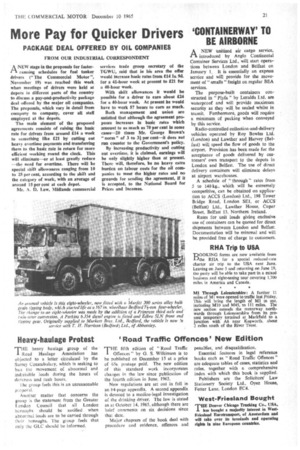More Pay for Quicker Drivers
Page 23

If you've noticed an error in this article please click here to report it so we can fix it.
PACKAGE DEAL OFFERED BY OIL COMPANIES
FROM OUR INDUSTRIAL CORRESPONDENT
A NEW stage in the proposals for faster
running schedules for fuel tanker drivers (" The Commercial Motor ", November 19) was reached this week when meetings of drivers were held at depots in different parts of the country to discuss a pay-and-productivity package deal offered by the major oil companies. The proposals, which vary in detail from company to company, cover all staff employed at the depots.
The main element of the proposed agreements consists of raising the basic rate for drivers from around 114 a week to something like 121 by cutting out heavy overtime payments and transferring them to the basic rate in return for more efficient working round the clock. This will eliminate—or at least greatly reduce —the need for overtime. There will be special shift allowances ranging from 10 to 25 per cent, according to the shift and the category of work, with an average of around 15 per cent at each depot.
Mr. A. D. Law, Midlands commercial services trade group secretary of the TGWU, said that in his area the offer would increase basic rates from 114 is. 9d. for a 41-hour week at present to /21 for a 40-hour week.
With shift allowances it would be possible for a driver to earn about 124 for a 40-hour week. At present he would have to work 57 hours to earn as much.
Both management and union are satisfied that although the agreement proposes increases in basic rates which amount to as much as 70 per cent in some cases-20 times Mr. George Brown's " norm " of 3 to 34 per cent—it does not run counter to the Government's polky.
By increasing productivity and cutting out overtime, it is claimed, earnings will be only slightly higher than at present. There will, therefore, be no heavy extra burden on labour costs for the oil companies to meet the higher rates and no grounds for sending the agreement, if it is accepted, to the National Board for Prices and Incomes.




























































































































